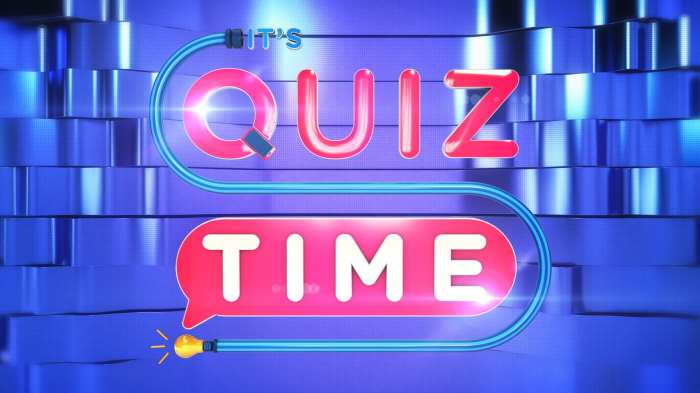Step into the captivating world of radio’s first major quiz show, “Information Please!” As we delve into its history, impact, and evolution, you’ll discover the fascinating origins of a genre that continues to entertain audiences today.
Launched in 1938, “Information Please!” became an instant sensation, revolutionizing the radio landscape and setting the stage for a golden age of quiz shows.
Quiz Show Origins

Quiz shows have a long and storied history, dating back to the early days of radio. The first major quiz show, Information Please, debuted on NBC in 1938 and quickly became a hit. The show featured a panel of experts who answered questions from listeners, and its success helped to pave the way for a golden age of radio quiz shows.
There were several factors that contributed to the rise of radio quiz shows. First, the advent of radio broadcasting in the 1920s created a new medium for entertainment and education. Second, the Great Depression of the 1930s led to a decline in advertising revenue, which made quiz shows a relatively inexpensive way to fill airtime.
Third, the popularity of crossword puzzles and other word games in the 1930s helped to create a receptive audience for quiz shows.
Factors Contributing to the Rise of Radio Quiz Shows
- The advent of radio broadcasting in the 1920s created a new medium for entertainment and education.
- The Great Depression of the 1930s led to a decline in advertising revenue, which made quiz shows a relatively inexpensive way to fill airtime.
- The popularity of crossword puzzles and other word games in the 1930s helped to create a receptive audience for quiz shows.
“Information Please!”

In the golden age of radio, “Information Please!” emerged as a groundbreaking quiz show that captivated audiences with its blend of knowledge, humor, and entertainment. First aired in 1938, the show quickly became a cultural phenomenon, setting the stage for the popularity of quiz shows that followed.
Format and Hosts
The format of “Information Please!” was simple yet engaging. A panel of experts, including renowned journalists, scholars, and celebrities, answered questions submitted by listeners. The show was hosted by the witty and erudite Clifton Fadiman, who brought a touch of sophistication and humor to the proceedings.
Contestants
Contestants on “Information Please!” were chosen from the audience and represented a diverse range of backgrounds and occupations. They competed for cash prizes and the opportunity to prove their knowledge on a national stage. The show’s popularity also attracted celebrity guests, who often joined the panel or competed as contestants.
Impact on Radio Broadcasting
“Information Please!” had a profound impact on radio broadcasting. It demonstrated the potential of radio as a medium for both entertainment and education. The show’s success inspired a wave of similar quiz shows, which became a staple of radio programming for decades to come.
Moreover, it helped to raise the intellectual level of radio content and encouraged listeners to engage with current events and expand their knowledge.
Quiz Show Evolution

After the debut of “Information Please!”, radio quiz shows underwent significant evolution. The genre diversified, with various formats and styles catering to different audiences.
Panel Shows, Radio’s first major quiz show
Panel shows featured a group of experts or celebrities who answered questions posed by a host. The panelists often engaged in lively debates and discussions, adding an element of entertainment to the quiz format.
- “Quiz Kids”(1940-1953): A popular show featuring a panel of brilliant children who answered questions on a wide range of subjects.
- “The Big Broadcast”(1944-1956): A celebrity-driven panel show where contestants competed for prizes.
Audience Participation Shows
These shows allowed listeners to participate directly by calling in or writing letters with their answers. This interactive format increased audience engagement and created a sense of community.
- “Double or Nothing”(1940-1953): A popular show where contestants answered questions for increasing amounts of money.
- “Take It or Leave It”(1944-1954): A show where contestants were given the choice to answer questions or pass them on to other contestants.
Adaptation to Changing Tastes
As radio audiences evolved, quiz shows adapted to changing tastes. They incorporated humor, music, and sound effects to make the shows more entertaining.
Tune in to the fascinating history of radio’s first major quiz show, where contestants faced challenging questions for a chance to win big. For those seeking an escape from the ordinary, check out the escape from verona answer key . Dive into this thrilling adventure game and test your wits.
Afterward, return to the captivating world of radio quiz shows, where knowledge and entertainment intertwined.
The rise of television in the 1950s led to a decline in radio quiz shows, but the genre continued to thrive in other formats, such as syndicated radio shows and online quizzes.
Quiz Show Impact

Radio quiz shows captivated audiences, becoming a cultural phenomenon that left a lasting mark on popular culture.
They fostered a sense of community, bringing people together to engage in intellectual challenges and shared entertainment. The popularity of these shows inspired other forms of entertainment, such as television game shows and board games, and popularized the concept of trivia as a form of leisure.
Legacy in Modern Media
The legacy of radio quiz shows continues to resonate in modern media.
- Television Game Shows:Radio quiz shows paved the way for the development of television game shows, which continue to entertain audiences worldwide.
- Online Trivia Platforms:The popularity of trivia has extended to online platforms, where websites and apps offer a vast array of quiz content, fostering intellectual engagement and competition among users.
- Educational Value:Radio quiz shows not only entertained but also educated listeners, sparking an interest in history, science, and other subjects. This legacy continues in modern educational programs that incorporate game-like elements to enhance learning.
FAQ Corner: Radio’s First Major Quiz Show
Who hosted “Information Please!”?
The show was hosted by Clifton Fadiman, a renowned author and editor.
What was the format of “Information Please!”?
The show featured a panel of experts who answered questions submitted by listeners. Contestants could win prizes for correctly answering questions.
How did “Information Please!” impact radio broadcasting?
The show’s popularity helped to establish quiz shows as a staple of radio programming and paved the way for other successful quiz shows.

